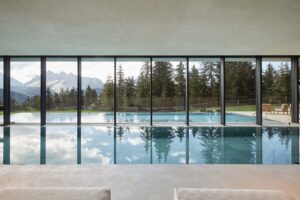
FORESTIS – A Luxury Eco-Conscious Retreat
FORESTIS is a luxury, eco-conscious retreat nestled in the beautiful Dolomite Mountains of Italy.
Maldives and Thailand
Abbigale Shi April 29, 2021
Founded by couple Sonu and Eva Shivdasani, Soneva started in an abandoned building on the Kunfunadhoo Island, Maldives, though has since grown into a travel empire rooted in sustainability, luxury, and the goal of reconnecting us with our natural surroundings. Arrive at any one of their four sustainable luxury resorts and you’ll be greeted with stunning landscapes and natural views, all of which are experienced intimately through Soneva’s philosophy of barefoot living. Beyond their atmospheric landscaping and accommodations, however, Soneva sustainable luxury resorts also offer a uniquely eco-conscious experience, one that is supplemented by locally sourced food and activities such as watching movies under the stars or glassblowing workshops that feature a myriad of recycled materials.
In attuning itself to the distinct landscape of its various locations while constantly striving for sustainability and precision, Soneva surpasses the expectation of simply being another resort that provides a break from the modern world. Rather, Soneva imparts an essential lesson upon its visitors, one that teaches us to coexist with our environment. Sonu and Eva’s story demonstrates how sustainability has been woven into Soneva’s mission from its humble beginnings in an abandoned building to its four locations across the Maldives and Thailand.
What is your hometown?
SS: I was born and educated in England, with some periods of my life also spent in Nigeria and Switzerland.
ES: I was born and brought up in Sweden.
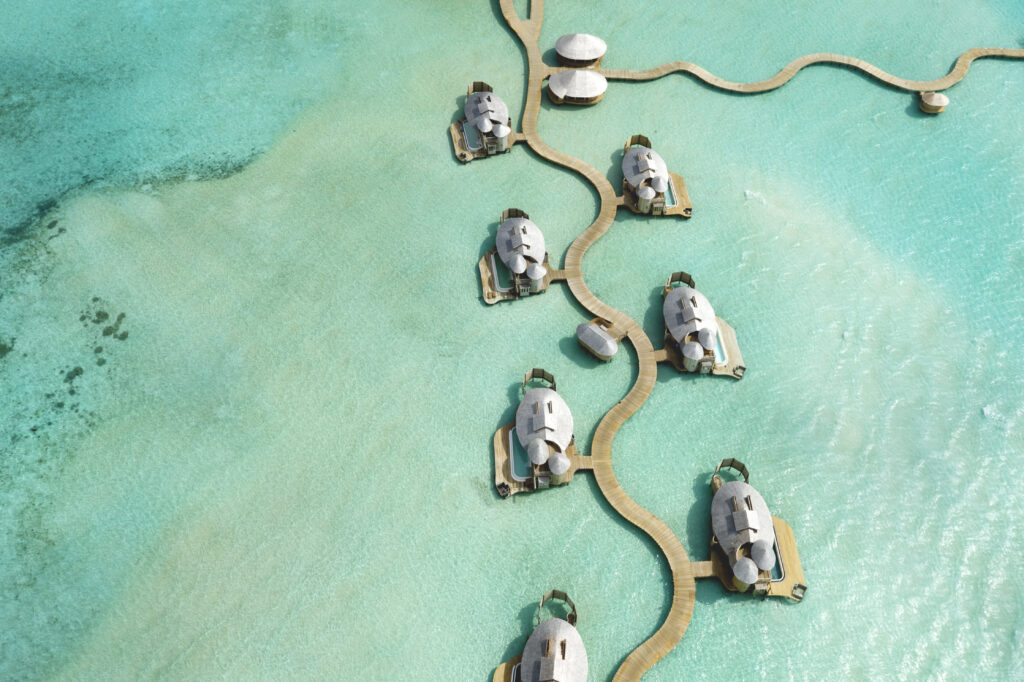
Where did you go to school?
SS: I’m an Alumni of Eton College and a graduate of Oxford University, where I earned an MA in English Literature.
Where are you currently located?
SS & ES: Our home is at Soneva Fushi in the Maldives. To us, it is the most wonderful place in the world.
Before your current occupation, what did you do?
SS: For the first four years after graduating from Oxford, I worked with and managed our family finance business in Geneva and assisted with some of the assets owned by the family.
ES: I was a top fashion model for some of Europe’s leading luxury houses. I have done campaigns for several high-end fashion houses and appeared in more than one hundred magazines worldwide such as Vogue, Harper’s Bazaar, Elle, Marie Claire, and Cosmopolitan. Before we started Soneva, my dear friend Lena and I, also launched a successful Paris-based clothing brand, LEVA.
Where did you meet?
SS: I met Eva in Monte Carlo at the Grand Prix, it was a chance happening. That said, we did not manage to spend enough time together. We got together later that summer and I believe that it was the three days that we spent on our own in Florence where I really fell in love with her and realized that I was going to marry her. Funny enough we were back in Florence 3 years later when I proposed to her.
ES: I went to the Grand Prix for the sun, and my friends went for the Formula 1 race. I was on one of the boats in the harbour and on the next boat was Sonu, my future husband. He loved racing and was on his way to watch the race.
Meanwhile, his sister walked by the boat I was on, and I had met her six months before at a wedding in Salzburg. She invited me to tea on her mom’s boat. When I was there, this cute-looking guy comes aboard. It turns out he was her brother, Sonu. It was love at first sight but both of us did nothing, and by incredible chance, we met again and the rest is history.
What inspired you to create Soneva Fushi? What were the first steps in making your dream a reality?
SS: We visited the Maldives during our honeymoon, and we fell in love with the place. It was my first time there and I had never seen anything quite like it. Eva loved the untouched, simple way of life in the Maldives.
We decided we wanted to open a resort like no other, whilst ensuring we protect the environment. We believe that a company must have a clear purpose beyond turning a profit. It must serve and contribute to the society in which it operates and should not negatively impact the environment in which it is located.
Together we combined our respective experience in management, style and design to develop a resort that would satisfy our desire for a dream destination for those who liked to travel in luxurious style. We bought an abandoned resort on far-flung 100-acre Kunfunadhoo Island in the Maldives and set about creating our dream.
ES: I had come to the Maldives for the first time for a photoshoot in 1977. The airport I believe was just recently built, and it consisted of a hut with sand on the floor. No one even cared to look at our passports! We had to ask them for an arrival stamp!
I fell in love with the beauty of the islands. The hotel was not great. They had just opened up to tourism and did not know what a hotel should be like. But I didn’t care, as the sand, sun and sea were the most amazing I had ever seen (and I had been to Seychelles). I thought I would only come back to the Maldives with someone I was very much in love with. So, years later, I brought Sonu to the Maldives and that is when we decided to build Soneva Fushi.
When did you first become interested in sustainability? What is the “Slow Life Movement” and how does this relate to your business model? How do you define Eco-Travel? What are the sustainable certifications in the travel industry?
SS: Sustainability runs through our core and we are always striving to limit the negative environmental impact of our activities – something which is both difficult as well as critical for a company that operates resorts in remote places of pristine natural beauty. We may sometimes fall short of our own high standards, but we are very clear about our responsibilities as custodians of these beautiful places in which we operate. SLOW LIFE is a guiding principle for all our hosts (employees). It is our moral compass as well as our operating compass.
We have pursued our concept of Intelligent Luxury, which is our desire to challenge and to fully understand true luxury, not an outdated version that is commonplace in the luxury industry.
ES: Thanks to my parents, I was always brought up thinking of the planet. Being Swedish, I was brought up respecting nature, animals, and people, and not to waste any of our resources, water, electricity, and energy in general.
Elegance does not have to be marble and gold; it can be a natural environment – and under the feet, open bathrooms, a beach right outside one’s villa, and dining in the open under the stars. We also pride ourselves on having high ethics when it comes to resort food. We would never serve anything like caviar, forced-fed Foie Gras, boxed veal, turtle or shark fin soup, birds’ nests, or any other unethical or endangered species.
We grow our own salads – organically, of course – and filter our own water that’s cleaner and healthier than any bottled water and we also add only the good minerals. For a special treat, we also offer four kinds of crystals mixed in a closed wand in the water. This water is offered in the bar with a clear explanation about the benefits of each crystal.
We believe that Intelligent Luxury is all about creating unforgettable, enlightening experiences whilst treading lightly on the earth. Expense, we would argue, is not indicative of luxury. Rarity, however, is.
Why did you choose the location of the island Kunfunadhoo for Soneva Fushi? What natural materials did you use to build this resort?
SS: We found the spectacular deserted island of Kunfunadhoo in Baa Atoll and we knew instantly that we wanted to live here. The only challenge was that the Maldives did not allow foreigners to own private homes. To overcome this challenge the only solution was to set up a resort. It was not done overnight though. We met a lot of skepticism in our quest to build our dream. For one, my family thought I was mad given I had no experience in the hospitality industry.
What attracted us to the Maldives was its natural beauty and we knew that to preserve that, we needed to limit the number of people coming. I strongly believe that combining luxury and sustainability is the right business model and that when done right is the most successful business model. However, I had no idea that our intensely personal vision of a locally crafted villa and environmentally responsible lifestyle would form the basis of a successful collection of world-class resorts. But that’s exactly what happened. Soneva Fushi was the first castaway resort in the Maldives, pioneering a trend for back-to-nature luxury holidays. What we also did not realise was that our decision helped transform the Maldives from a three-star high-volume destination into the luxury destination it is today.
ES: Finding natural materials at that time was one of the biggest challenges I faced while we were building Soneva Fushi. I told our construction manager and Sonu that there was no way I would allow wood to be used that came from rainforests!
I insisted on only using sustainable wood for the construction of the resort and furniture. They gave me the nickname The Conscience! I would not let anyone cut down any tree and we planned the buildings around the trees. Our own house was built around some amazing trees (a banyan tree, a screw pine tree, and an almond tree).
I had all the furniture and items made in Indonesia and Thailand. We did not have enough carpenters on the island to be able to make a lot on-site. Luckily, I found a supplier in Bali who understood what I wanted. I told him that everything had to be ecological. We used plantation teak, recycled old wood, coconut wood, bamboo, and even papier machѐ for mirror frames, fruit bowls, and rubbish bins.
What social and environmental SDGs do you implement at Soneva Fushi?
SS, ES: In 2017, we entered an official partnership with the United Nations Development Programme (UNDP) to encourage greater collaborations on numerous events and projects, in line with the objectives of the UN’s Sustainable Development Goals (SDGs).
In recent years, we have undertaken several programmes to alleviate the impact of climate change and to help local communities with various issues. For example, the Soneva Ocean Stewards (SOS) programme has taught hundreds of children how to swim and encourages the local community to appreciate the precious marine ecosystem surrounding them. Likewise, the Soneva Foundation’s Myanmar Stove’s Campaign has provided around 13,000 clean-burning cooking stoves to families in Myanmar, preventing over half a million tonnes of CO2 from entering the atmosphere and providing 60,000 people with access to a safer cooking method.
For many years, Soneva has continued to break down traditional barriers and encourage greater partnership and collaboration between the business sector with communities and environmental organizations. Our business model ensures that we consistently support our local communities and the environment, and we are very proud of our results. The UNDP partnership allows us to work more effectively to improve environmental and social issues from waste management to female empowerment, access to clean water to the protection of our oceans, and much more. The world will only get better if individuals, businesses, and governments work together.
What’s unique about Soneva resorts?
SS: I am proud that Soneva is known as the original barefoot and sustainable luxury destination and of our ability to combine luxury sustainably. I am also proud that we have won some of the world’s top awards for both luxury and sustainability, including the World Travel & Tourism Council’s Tourism for Tomorrow Award. The readers of Conde Nast Traveller U.K. have voted us the Best of the Best many times. Some of my favourite signature Soneva features of our resorts are the outdoor cinemas, the observatories, the water slides, the organic gardens, and the large outdoor bathrooms. We believe these are true luxuries; watching a film under the star-lit sky, exploring the wonders of space, and bathing whilst surrounded by nature.
ES: When our guests arrive, the first thing we do is ask if they would like to take off their shoes. Our ‘No News, No Shoes’ mantra helps ground our guests and lets them feel the sand between their toes. Some never put their shoes back on for their entire stay with us. We have had guests say it feels strange to go back to socks, shoes, and high heels once they leave. With our food and beverage offerings, we do our best to source as locally as possible, be that from our organic gardens, from the plentiful seas that surround our islands, or sourced from nearby islands and countries. Each of our resorts has its own organic gardens in which we grow herbs, fruit, and vegetables for our restaurants. We believe this is the best way to get the freshest and most delicious produce to our guests. It also eliminates the need for produce to be transported to our resorts, therefore lowering the amount of carbon we need to offset. Other examples are the fair-trade dark chocolate in our chocolate rooms or the biodynamic and organic wines that dominate our wine lists.
When and how did your business evolve into a chain of sustainable luxury resorts and hotels? Why did you expand? Are all of your properties committed to the same SDG goals? How are you directly impacting the world in a positive way?
SS: When we opened Soneva Fushi, it stood out as a unique and new concept in luxury travel. We then opened Soneva Kiri in 2009, launched Soneva in Aqua in 2015, and Soneva Jani in 2016. With each new resort that we opened, we innovated and improved upon our initial ideas. However, our core of sustainably runs through every property or project that we launch. Our latest expansions have been the new water retreats at Soneva Fushi and the launch of a new era of overwater luxury with Chapter 2 at Soneva Jani. We are continuously peeling skins of the onion and constant change and improvement are key to our success.
How do guests experience sustainability at Soneva? What do you hope guests take away from their stay at any of Soneva’s resorts?
SS: The rich ecosystem that we have at each of our resorts creates fantastic guest experiences. Sustainability and health are hallmarks of something that our guests rarely experience in their home cities. It is rare to enjoy oneself and not harm one’s body. It is rare to enjoy oneself and not damage the environment. It is a luxury in which we too rarely indulge. Therefore, we have combined apparent opposites and found ways in which these apparent opposites can live hand in hand.
Our guests change a little while they’re with us. They love taking a shower or watching a movie under a starlit sky. It is the simple things that take our guest’s experience to a new, rare and very beautiful place. We have also introduced a range of conscious experiences at each of our resorts.
ES: The demand is not for bling-bling. On the contrary, guests want more and more natural environments, and fresh food (we grow our own salads and mushrooms and catch our own fish). They also seek rare experiences, such as visiting our observatory, which is the second-largest private telescope in the Indian Ocean, after the one at Soneva Jani, or going on dolphin cruises, experience Sonu’s Picnic, learn how to blow glass in our one of a kind glass studio, which uses only recycled glass from empty wine bottles, empty jars, etc. Or maybe to stay overnight at our sandbank in the middle of the ocean, watch an outdoor movie under a starlit sky on the biggest screens in the Indian Ocean, (at all Soneva resorts) and many other amazing experiences.
The Soneva Foundation supports many initiatives such as the Thailand Reforestation Project, Ocean Stewards, and Myanmar Cookstoves Campaign. How do you decide which communities and causes to support? How do your resorts support local communities?
SS, ES: The reason we set up the Soneva Foundation was to reinforce our SLOW LIFE Core Purpose and also as a result of making small tweaks to our business model that did not negatively impact on either our profitability, or our guest’s perception of us, but which raised substantial capital for good causes such as banning branded water and introducing our mandatory 2% carbon levy. The hotel industry benefits the richest 20-30% of the planet and because of our resource-hungry ways, at the expense of the poorest 70-80%. In summary, we as an industry consume more than our fair share of resources.
Companies must become the solution, not the problem. Companies must have a purpose beyond just enriching shareholders and paying employees a salary. This approach can also lead to much higher levels of staff engagement and as a result magical service which is the ultimate measure of a luxury hotel experience. The Soneva Foundation has used the money it has raised to fund a reforestation programme in northern Thailand where we have planted around half a million trees to mitigate 400,000 tons of CO2. It has funded a windmill in South India. It is also using the money we raise to provide 150,000 heavily subsidized cooking stoves in Myanmar and Darfur. These stoves are extremely efficient and thus prevent the need for trees to be felled, reduce indoor toxic emissions, and also mean that women do not need to spend as much back-breaking time carrying firewood away from the protection of their villages. Our savings from not serving imported branded water but the water that we produce on the island has given 600,000 people access to clean water from over 400 projects that we have funded in 50 different countries.
How has the COVID-19 pandemic impacted your business? How have you supported your employees during this period?
SS, ES: This quieter period was an opportunity for our Hosts to improve our properties and to carry out things that they have never managed to do when we have been busy. Most importantly, it is important that each one of us think about this experience and considers what we have learned from this. In terms of business, the Maldives has seen a tremendous revival and our resorts are surpassing their 2019 numbers.
Also, at Soneva, we still went ahead with a lot of our charitable initiatives that are being funded by the Soneva Foundation. The Soneva Namoona initiatives continued and we are currently in the process of building another waste recycling centre on a local island. This time the centre will be located on the island of Dharanvandhoo where a lot of our Hosts at Soneva Fushi come from.
We expect that people will come out of these times with a different perspective on life and different priorities. They will prioritize mother nature and will want to minimize their impact on the environment when they travel on holiday. All of this should be in our favour as sustainability is part of our DNA.
During the months of the lockdown we carried the below initiatives for our hosts on the island:
What are your hopes and vision for Soneva in the future? How do you plan to continue to impact the world in a positive way?
SS: I see myself running Soneva for the next 30 years. We have a fantastic future ahead of us. We will face as many crises as we have just experienced. However, I believe that if one takes on a crisis with a positive frame of mind, one will always overcome it. For Soneva, we are planning to build more resorts in the Maldives. We also plan to open a Soneva in Okinawa, Japan, where it will be a resort with a spa and residences like Soneva Fushi and Soneva Jani, with both overwater and island villas.
There is one more thing that I am excited about, Soneva Soul, which is a resort dedicated to wellness. At Soneva Soul, we want to place more emphasis on the medical aspect of wellness, such as rehabilitation and recuperation from medical procedures, as well as non-invasive medical treatments.
ES: Soneva will continue its efforts in guarding the beautiful surroundings that we have been blessed with, as this is part of our core beliefs.
Do you lead a conscious lifestyle? If so, how?
SS: After a health scare a couple of years ago, I gave up past guilty pleasures such as red meat, ice cream, and sweets in general. I extended the time in the gym from 30 minutes to an hour three times a week. I was stricter about creating breaks in my life. I reduced my traveling and also started to practice intermittent fasting. I started to enjoy my new lifestyle and diet and became attached to it. Living all these years with Eva has also inspired the conscious in me.
ES: Being Swedish, I was brought up in a conscious surrounding and with the values of sustainability engraved in me. Therefore, the SLOW LIFE philosophy is not such a stark contrast to my way of life even before we invented the philosophy.
I have never in 30 years thrown away any plastic in the Maldives, as there is no “away”. I always bring it out of the country. Sometimes I cannot refuse a plastic bag, in case I need to buy something and have nothing to carry it in, but I never throw them away and keep them forever, wash them and hang them up to dry to reuse, and my mother has always done the same, she is the one who taught me when I was little, and she already knew that plastic will stay forever and should be reused.
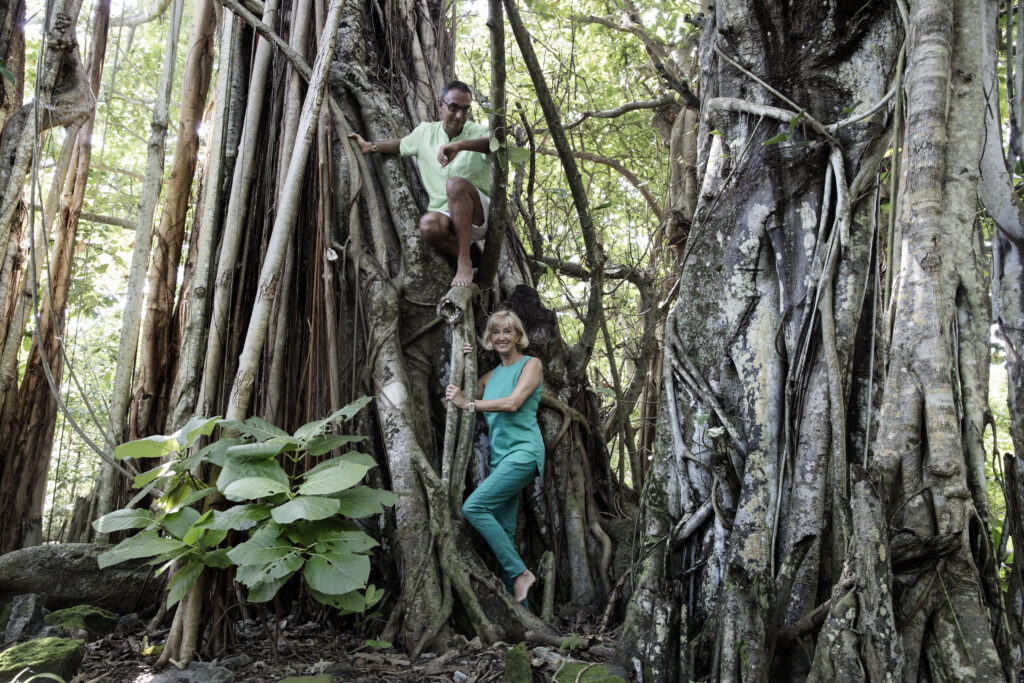
What have you learned about building your own business? What advice can you give to someone who would like to create a sustainable hospitality destination business of their own?
SS: I have seen huge growth within the eco-tourism luxury segment in the past few years, not only within the Maldives but also globally. I think this is because owners and directors understand that it makes a lot of business sense to be more focused on sustainability, as the demand for environmentally and socially responsible travel is increasing. It also makes sense financially if you do it the right way. Our earth’s resources are finite and we all need to be better guardians to protect the world we live in.
I believe anyone can do anything. I often refer to Henry Ford, where many years ago he stated: “whether you think you can, or you think you can’t – you are right!” This is a perfect quote to highlight how important attitude and determination are to one’s success.
ES: I think people will decide where to go where they think their visits will support the environment and the locals. I always believe that a resort or hotel should keep the funds in the country they are in and reinvest in everything local. And I think people are getting more and more aware and opening their eyes regarding careless attitude and unjust behaviour.
Photography courtesy of Soneva

FORESTIS is a luxury, eco-conscious retreat nestled in the beautiful Dolomite Mountains of Italy.
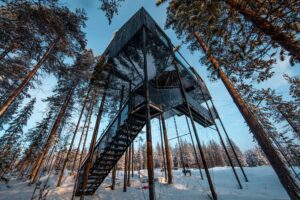
How Kent Lindvall and Britta Jonsson-Lindvall created eight unique Swedish tree houses, interweaving design and sustainability.
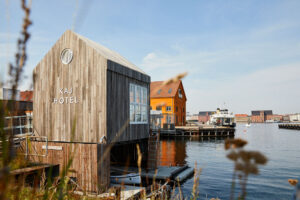
KAJ Hotel is a sustainable, simple two- to four-person houseboat hotel located in the Holmen neighborhood of Copenhagen, Denmark.